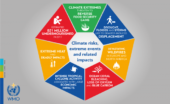Molly Minturn - My family is heartbroken to share that my father died in surgery on Monday, Feb. 10. It…
US Climate Security Act and aftermath
Written by Diana Thebaud Nicholson // June 9, 2008 // Business, Carbon, Economy, Environment & Energy, Politics, Public Policy, Trade & Tariffs, U.S. // Comments Off on US Climate Security Act and aftermath
June 9
China Issue to Live on After US Carbon Bill Death
(Planet Ark/Reuters) NEW YORK – The US climate bill may be dead but one thorny element of it — possible tariffs on energy-intensive imports from rapidly developing countries like China — will fester as lawmakers form new greenhouse legislation.
Introduced to the US Congress by industrial players such as power utility American Electric Power and industrial worker unions, the issue, also known as competitiveness in climate legislation, boils down to two ideas.
First, if the United States embarks on a carbon emissions reduction program, the placement of a tariff on imports of emissions-intensive goods like cement, steel and chemicals would ensure that China and other rapidly industrializing countries do their part on global warming. The tariff would aim to equal the price that US carbon regulation had added to the same products made domestically.
Second, such a tariff would prevent heavy US industries from relocating to other countries that don’t regulate greenhouse gases to lower their operating costs.
June 8
Taking Climate Change Seriously — Finally
Obama And McCain Both See Climate Change As A Top Priority
(CBS) It’s been a long time coming, but the United States is finally going to have a President who takes climate change seriously enough to do something about it.
The day before Senator Barack Obama clinched the Democratic Party’s nomination for president, his colleagues in the United States Senate began preparing for the biggest global warming vote in Washington’s history. The bill under debate, The Climate Security Act would for the first time impose large, mandatory cuts on greenhouse gas emissions in the US. The bill was not expected to become law, if only because of President Bush’s promised veto, and by the end of the week stalling tactics by Senate Republicans had blocked the bill from even coming to a vote. Nevertheless, the Senate debate was a defining moment in US climate politics, not least for what it revealed about how the next President — either Obama or Senator John McCain — will address the climate issue when he takes office in 2009.
In contrast to Bush, both McCain and Obama have long said that climate change is a top-priority threat that requires real action now. Environmentally, Obama’s proposals are stronger. The Democrat favors what science says is necessary: an 80 percent cut in emissions by 2050. As President, Obama would achieve this through a “cap and trade” system that sells corporations permits to emit greenhouse gases and then invests the resulting revenue in green energy development and rebates to Americans hit by higher energy prices.
June 6
US climate change bill is blocked
(IHT) A US attempt to establish a system of caps and tax relief to cut carbon emissions has been blocked in Congress.
The bill was backed by most senators, but did not get the 60 votes needed to stop a delaying tactic – a filibuster – used by the bill’s opponents.
Lawmakers will now wait until next year – when there will be a new president – before attempting to pass a new bill.
June 3
Bush Would Veto US Climate Change Bill
(Planet Ark/Reuters) WASHINGTON – Even before debate began Monday on the first comprehensive climate change bill to reach the Senate floor, the White House said President Bush would veto it in its current form.
Bush himself slammed the bill, saying it would cost the US economy $6 trillion.
Comments on U.S. climate change bill
WASHINGTON – President George W. Bush on Monday slammed a bill on combating climate change being debated by the U.S. Senate this week. More from Reuters Factbox
Senate taking up key climate-change bill
(San Francisco Chronicle) The Senate will vote today to begin debate on a bill that could reshape the U.S. economy by requiring industry to pay to emit carbon dioxide and other heat-trapping gases. Opponents call it a new tax on industry that could raise gas prices and energy bills for consumers. Supporters say it’s a crucial step to advance cleaner energy and protect the planet.
Climate Bill Poses a Dilemma for Supporters
The measure places its backers in an awkward position because it essentially forces them to come out in favor of higher energy costs at a time when American consumers are already facing record-high fuel prices.
While the three candidates are on record favoring legislative action on global warming, the Bush administration opposes the far-reaching bill that will now be debated in the Senate this week. The measure’s sponsors say the nation must take immediate action to reduce dependence on fossil fuels and cut carbon emissions, but many Senators in both parties see the legislation as a hugely expensive long-term plan that will do little to solve today’s energy supply and price problems.
The debate will force senators to take a stand on some of the most difficult, expensive and potentially life-altering questions that will face the world in coming decades. Proponents say that the nation cannot afford to wait until fuel prices come down to begin to deal with these problems. Opponents argue that the bill would direct the largest changes in the American economy since the 1930s and should not be rushed through Congress without painstaking debate.



